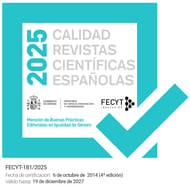De nuevo sobre la apócope extrema. Observaciones a la hipótesis de Lema (1997)
Resumen
El objetivo de nuestro artículo es presentar y discutir la explicación que sobre la apócope, tanto normal como extrema, ofrece el romanista mexicano Lema (1997). Lema asume como punto de partida de su hipótesis la ruina del sistema declinativo del latín clásico y la consolidación románica de la íntima asociación entre la vocal final y el género gramatical (/–a/ = femenino, /–o/ = masculino). Él opina que la ausencia de valor morfemático, en lo que respecta a la categoría de género gramatical, de la /–e/ provocó necesariamente su pérdida en posición final absoluta de palabra. Intentaremos mostrar que el razonamiento de Lema no es aceptable por varias razones. Nuestra idea sigue siendo que la correcta explicación de la apócope medieval ha de partir de parámetros fonéticos, en la línea expositiva desarrollada por Lapesa, no morfológicos.
Los trabajos publicados en esta revista son propiedad de sus respectivos autores y autoras, quienes conceden a la Revista de Filología de la Universidad de La Laguna el derecho de primera publicación, tal y como se recoge en nuestra Política de derechos de autoría.









